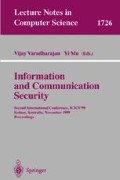Abstract
In this paper we discuss how one can delegate his power to authenticate or sign documents to others who, again, can delegate the power to someone else. A practical cryptographic solution would be to issue a certificate that consists of one’s signature. The final verifier checks verifies the chain of these certificates. This paper provides an efficient and provably secure scheme that is suitable for such a delegation chain. We prove the security of the scheme against an adaptive chosen message attack in the random oracle model.
Though our primary application would be agent systems where some agents work on behalf of a user, some other applications and variants will be discussed as well. One of the variants enjoys a threshold feature whereby one can delegate his power to a group so that they have less chance to abuse their power. Another application is an identity-based signature scheme that provides faster verification capability and less communication complexity compared to those provided by existing certificate-based public key infrastructure.
Access this chapter
Tax calculation will be finalised at checkout
Purchases are for personal use only
Preview
Unable to display preview. Download preview PDF.
References
Bellare, M., Rogaway, P.: Random oracles are practical: a paradigm for designing efficient protocols. In: First ACM Conference on Computer and Communication Security, pp. 62–73. Association for Computing Machinery (1993)
Bellare, M., Rogaway, P.: Optimal asymmetric encryption. In: De Santis, A. (ed.) EUROCRYPT 1994. LNCS, vol. 950, pp. 92–111. Springer, Heidelberg (1995)
Beth, T.: Efficient zero-knowledge identification scheme for smart cards. In: Günther, C.G. (ed.) EUROCRYPT 1988. LNCS, vol. 330, pp. 77–86. Springer, Heidelberg (1988)
Blaze, M., Bleumer, G., Strauss, M.: Divertible protocols and atomic proxy cryptography. In: Nyberg, K. (ed.) EUROCRYPT 1998. LNCS, vol. 1403, pp. 127–144. Springer, Heidelberg (1998)
Brands, S.: Secret-key certificates. Technical Report CS-R9510, CWI (1995)
Ellison, M., Frantz, B., Lampson, B., Rivest, R., Thomas, B.M., Ylonen, T.: Simple public key certificate. Internet-Draft (1998)
Feldman, P.: A practical scheme for non-interactive verifiable secret sharing. In: 28th FOCS, pp. 427–437 (1987)
Fiat, A., Shamir, A.: How to prove yourself: Practical solutions to identification and signature problems. In: Odlyzko, A.M. (ed.) CRYPTO 1986. LNCS, vol. 263, pp. 186–199. Springer, Heidelberg (1987)
Guillou, L.C., Quisquater, J.-J.: A practical zero-knowledge protocol fitted to security microprocessor minimizing both transmission and memory. In: Günther, C.G. (ed.) EUROCRYPT 1988. LNCS, vol. 330, pp. 123–128. Springer, Heidelberg (1988)
Mambo, M., Usuda, K., Okamoto, E.: Proxy signatures: delegation of the power to sign messages. IEICE Transaction of Fundamentals of electronic Communications and Computer Science 9(E79-A), 1338–1354 (1996)
Ohta, K., Okamoto, T.: On concrete security treatment of signatures derived from identification. In: Krawczyk, H. (ed.) CRYPTO 1998. LNCS, vol. 1462, pp. 354–369. Springer, Heidelberg (1998)
Okamoto, T.: Provably secure and practical identification schemes and corresponding signature schemes. In: Brickell, E.F. (ed.) CRYPTO 1992. LNCS, vol. 740, pp. 31–53. Springer, Heidelberg (1993)
Pedersen, T.P.: Non-interactive and information-theoretic secure verifiable secret sharing. In: Feigenbaum, J. (ed.) CRYPTO 1991. LNCS, vol. 576, pp. 129–140. Springer, Heidelberg (1992)
Schnorr, C.P.: Efficient signature generation for smart cards. Journal of Cryptology 4(3), 239–252 (1991)
Shamir, A.: Identity-based cryptosystems and signature schemes. In: Blakely, G.R., Chaum, D. (eds.) CRYPTO 1984. LNCS, vol. 196, pp. 47–53. Springer, Heidelberg (1985)
Author information
Authors and Affiliations
Editor information
Editors and Affiliations
Rights and permissions
Copyright information
© 1999 Springer-Verlag Berlin Heidelberg
About this paper
Cite this paper
Abe, M., Okamoto, T. (1999). Delegation Chains Secure Up to Constant Length. In: Varadharajan, V., Mu, Y. (eds) Information and Communication Security. ICICS 1999. Lecture Notes in Computer Science, vol 1726. Springer, Berlin, Heidelberg. https://doi.org/10.1007/978-3-540-47942-0_13
Download citation
DOI: https://doi.org/10.1007/978-3-540-47942-0_13
Publisher Name: Springer, Berlin, Heidelberg
Print ISBN: 978-3-540-66682-0
Online ISBN: 978-3-540-47942-0
eBook Packages: Springer Book Archive

